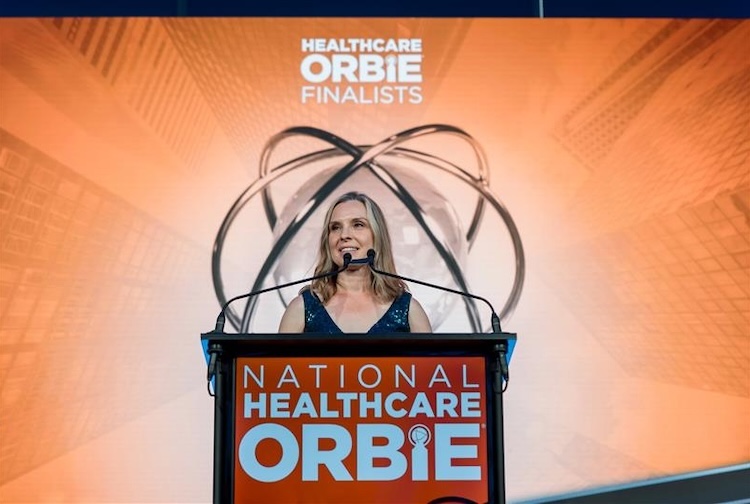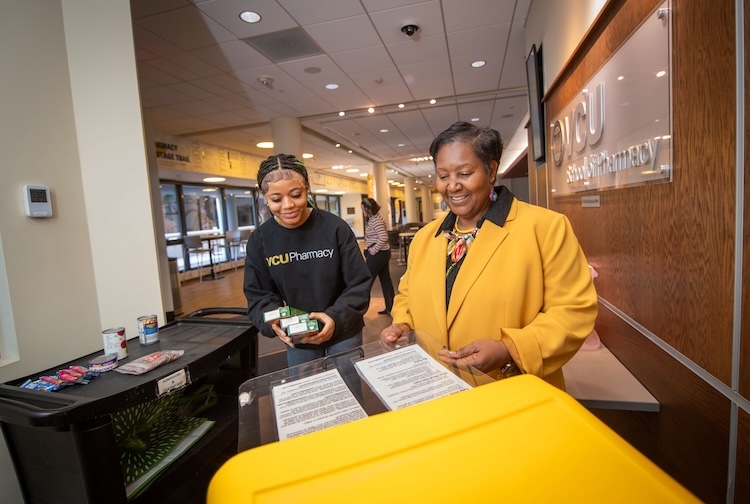How VCU Health IT has become a national leader in the health care information technology space
VCU Health’s chief information officer shares how her team is using technology to improve patient care and access.
September 26, 2025 Ellen Wiegand, senior vice president and chief information officer of VCU Health, was awarded the 2025 National Healthcare ORBIE Award. (Converge25)
Ellen Wiegand, senior vice president and chief information officer of VCU Health, was awarded the 2025 National Healthcare ORBIE Award. (Converge25)
By Pete Woody
The VCU Health IT team is increasingly seen as a national leader in the health care IT space, with innovations that positively impact patient care, clinical research and the overall team member experience. Led by chief information officer (CIO) Ellen Wiegand, the team aims to keep pushing forward to build on the strong foundation they’ve established for IT at VCU Health.
Wiegand’s leadership has also led to national recognition from industry leaders, which includes being named to the Constellation Research 2026 ‘Business Transformation 150’ list as well as Becker’s Hospital Review’s ‘100 women in health IT to know’ for 2025. And, in August, she was named ‘National Healthcare CIO of the Year’ at the annual ORBIE Awards in Washington, D.C.
“We want to do the work that VCU Health needs done, and we want to partner and make sure what we're rolling out is safe, effective and useful. So, I think [this award] reflects well on the organization as a whole in our ability to come together and leverage technology,” Wiegand said.
Wiegand spoke with us about what that national recognition means to her and the IT team and the importance of their partnerships with clinical and business teams at VCU Health.
What does winning the ‘National Healthcare CIO of the Year’ award mean to you, as well as to the VCU Health IT team and health system?
Ellen Wiegand: This recognition is more about the team than it is about me. It is fantastic recognition of our team’s achievements this year. It validates that all the planning and hard work have produced something meaningful to our health system and our community.
And for me, it provides inspiration to continue pushing the limits of what we believe is possible. That is what it's all about.
What are the VCU Health IT team’s main initiatives?
Ellen Wiegand: We talked a lot about our deployment of Epic, Workday, ServiceNow and establishing that strong foundation for IT for the future. We’ve made significant investments in these enterprise platforms.
Over the last year or so, the focus has been establishing the foundation for artificial intelligence (AI) and building out a modern data architecture to support the AI tools that we'll be rolling out.
We’ve deployed tools to reduce administrative burden and are using ambient clinical documentation to reduce time spent on note taking and give back time to direct patient care. We’re piloting additional tools to support our clinical team members, and we're excited about the future of that. We were among the first group of health systems to establish an AI workgroup and have a strategy around responsible AI in terms of principles and guidelines for the safe use of AI.
That has allowed us to adopt some of these tools, which is exciting. There's so much talk about AI, but to actually be putting it into use is something different. We've taken a very pragmatic approach to getting the work done, putting the framework in place, being able to successfully pilot some tools and learning from that.
How do you see this work impacting patient care and patient access?
Ellen Wiegand: We've worked hard to align technology efforts with our health system goals, and that certainly includes patient care and access.
I think the more we can put tools that are easy to use in the hands of our providers, the more time they'll have to take care of our patients and that will result in better care and a better patient experience. We've seen some good results with tools like Epic's Fast Pass opening up appointments. We have patients being seen months earlier through Fast Pass because we can offer them available appointments as they come online and they can accept them right there on the phone.
And so that’s huge. If you could see your doctor a couple months earlier than you thought, then you're getting timely and appropriate care and you're freeing up that appointment that was going to happen in a couple of months for another patient to come in.
We've talked about technology to improve the experiences of the team members and patients. What can you say about the research aspect, because that is such a big part of VCU Health and our affiliated academic institution, Virginia Commonwealth University?
Ellen Wiegand: One of the key drivers for the data architecture we're building, along with the policy and process, has been about how we can make it easier to safely access data for research purposes.
Some of the things we've done this year include standardizing medical student access to Epic for research purposes so we can train the next generation of researchers. We've rolled out Epic SlicerDicer for cohort finding for providers who are initiating research studies. And we’ve worked closely with the VCU Wright Center for Clinical and Translational Research to make sure we have a good pathway for them to pull data for IRB-approved research studies.




